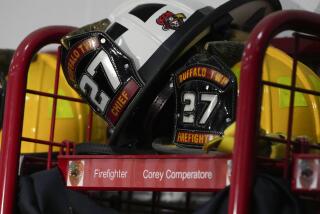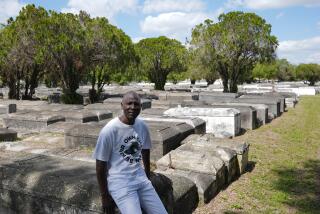In Charleston, Pinckney’s funeral brings long lines and words of hope
Reporting from Charleston, S.C. — Blacks and whites gathered by the thousands on the streets of Charleston on Friday to pay their last respects to state Sen. Clementa Pinckney and eight other parishioners who were slain by a white gunman last week at the Emanuel African Methodist Episcopal Church.
The mood was somber as the long line of mourners -- many dressed in black in the sweltering heat -- began lining up at dawn to enter the College of Charleston’s TD Arena, just a block away from the historic African American church where the nine parishioners were shot to death June 17. The attack has reopened questions about race across the nation.
Above the crowd loomed a statue of John C. Calhoun, the United States’ seventh vice president and a staunch defender of slavery.
“This is the true meaning of integration,” said Lee Kaplan, 70, a retired white psychoanalyst, as she stood with her husband looking at the crowd that queued more than six city blocks to hear President Obama deliver a eulogy for the victims.
Friday’s funeral offered another opportunity for the community to say goodbye to Pinckney and the eight other slain parishioners. Dylann Roof, 21, is being held on nine counts of murder.
About 9 a.m., a hearse -- accompanied by police cars with flashing lights -- carried Pinckney’s casket to the arena.
The police closed streets for blocks and steered mourners through a row of metal detectors to enter the arena, which has a capacity of only 5,100. Many were turned away.
“A lot of people got their hearts in the right place – to stand in line for so long in this heat,” Seaward Middleton, 68, a black retired civil service worker, said softly as he took in the crowd from the shade of a live oak tree.
Across the street, a white woman raised a green placard: “LOVE WINS EVERY SINGLE TIME.” Another had scrawled “ONE NATION UNDER GOD: INDIVISIBLE” in red and blue marker pens. Nearby, a black man in a straw hat sold “#Charleston Never Forget” T-shirts, inscribed with the names of the nine victims, for $10.
Tamara Bostick Baker, a cousin of Pinckney’s, woke up at 4:30 a.m. to drive to the ceremony from Ridgeland, S.C., about 75 miles away. Along the way, she passed scores of family, neighbors and local officials. “It feels like everyone in our community is here,” she said.
Joi Green, who sang “Hallelujah” with members of the New Birth Missionary Baptist Church, had set her alarm for 1:30 a.m. to make the five-hour journey from Atlanta.
“It was worth the trip,” she said as she stood near the back of the line. “It doesn’t really matter if we get in. We’re here.”
The show of unity broke for a moment as two young black men in baseball caps shouted at a white police officer who blocked their path from a portion of Meeting Street closed to the public. “Y’all be whipping us,” railed one of the men. “Y’all be keeping us slaves.”
Mozelle Odom, a minister at St. Matthew Baptist Church, rebuked them.
“Oh, come on, people,” she said. “Why don’t you start with love.”
“Just because I talk about black lives matter, doesn’t mean I don’t love my white sister,” one of the men said. “Stop making us look bad.”
“I’m making you look bad?” Odom said.
A hush fell over downtown as the ceremony began. All across the city -- in cafes, in boutiques, offices -- residents could be seen huddling over live feeds of the event. In the lush manicured grounds of Marion Square, two 20-somethings — a white woman and a black man — sat together below the Calhoun monument, silently peering into an iPhone to listen to a minister’s speech.
When Obama ended his eulogy -- with a rousing rendition of “Amazing Grace” -- the mood was joyful as everyone spilled out of the arena. Many held hands and linked arms. A white woman and black man looked into each other’s eyes and sang gospel songs.
“It was such a blessing to be part of this national history,” said Terri Lynn Durham, 47, a local public school teacher. “That was a sermon!” cried Mary Lee, 56, a black medical assistant, raising her arm up in the air.
“It made me believe in the human spirit again,” said Ken Bellamy, 47, a Charleston nurse who was one of the last mourners to make it into the arena before the gates closed. He was glad he did. Obama, he said, nailed the issue of the Confederate flag. “He said something I’m always trying to express, but he put it in a way that you just can’t argue with.”
“I feel two inches taller,” he said as he rushed to make an appointment.” I have never seen so many people, from all different walks of life, come together like this. I am walking out of her a different person – changed.”
The first two funerals, for Ethel Lance and Sharonda Coleman-Singleton, were held Thursday, with tight security and emotional responses to the eulogies and hymns.
Attendees included South Carolina Gov. Nikki Haley, Charleston Mayor Joe Riley, U.S. Rep. Mark Sanford, the Rev. Jesse Jackson and the Rev. Al Sharpton.
Police stood guard and checked bags as mourners filed in for the funerals, which were held as the debate over the Confederate flag and other Old South symbols continued around the region. A growing number of leading politicians have said that Civil War symbols should be removed from government property, despite their integral role as elements of Southern identity.
“A hateful, disillusioned young man came into the church filled with hate … and the reaction was love,” Riley said at the funeral for Coleman-Singleton, 45. “He came in with symbols of division. The Confederate battle flag is coming down off our state Capitol.”
Lance had served as a sexton at Emanuel for the past five years, helping to keep the historic building clean. She loved gospel music, watched over a family that grew to include her five children, seven grandchildren and four great-grandchildren, and pushed them to earn advanced degrees.
“I want my grandmother’s legacy to be what she stood for,” said granddaughter Aja Risher. “She is going to be a catalyst for change in this country.”
Jarvie reported from Charleston and Muskal from Los Angeles.
More to Read
Sign up for Essential California
The most important California stories and recommendations in your inbox every morning.
You may occasionally receive promotional content from the Los Angeles Times.











